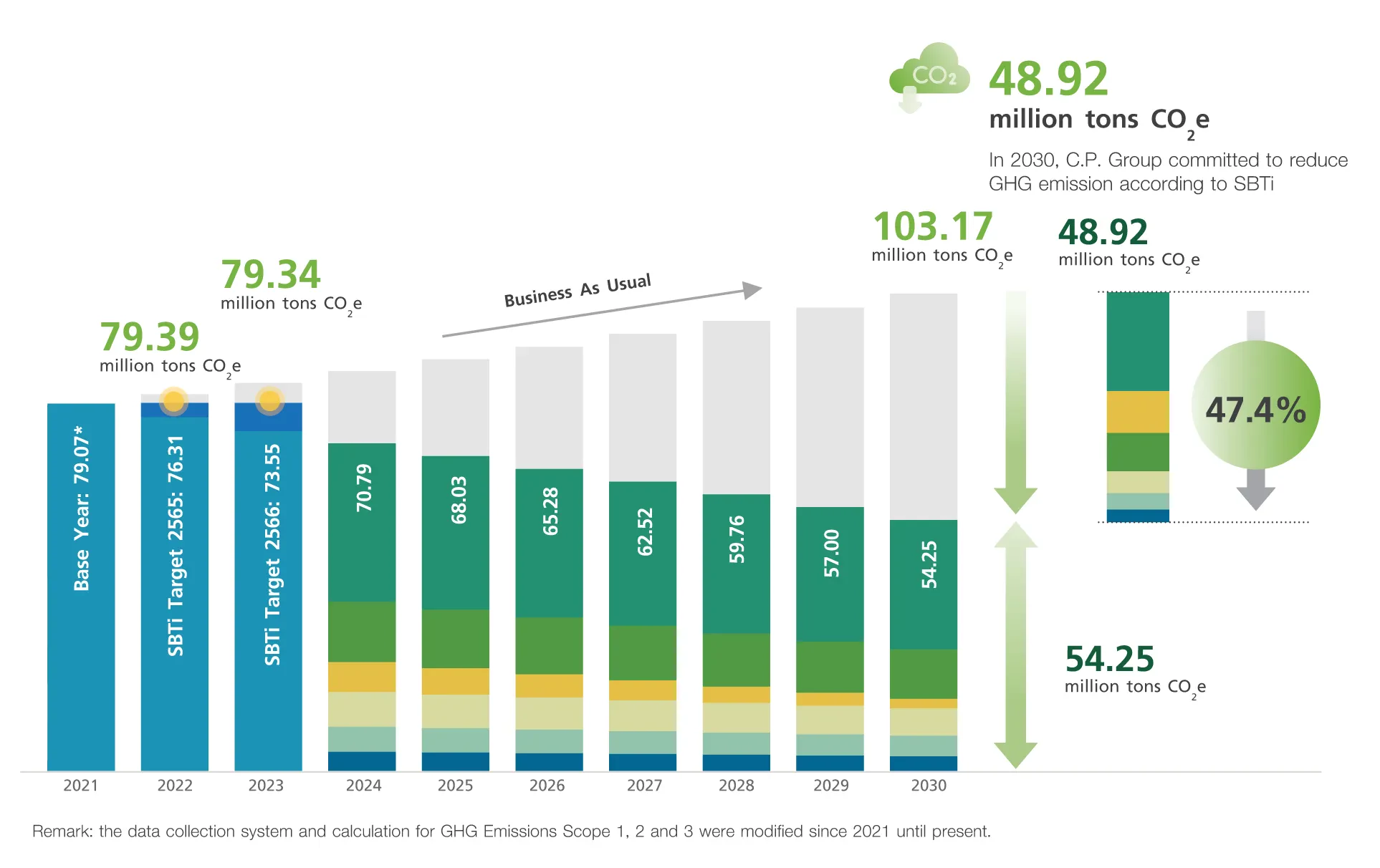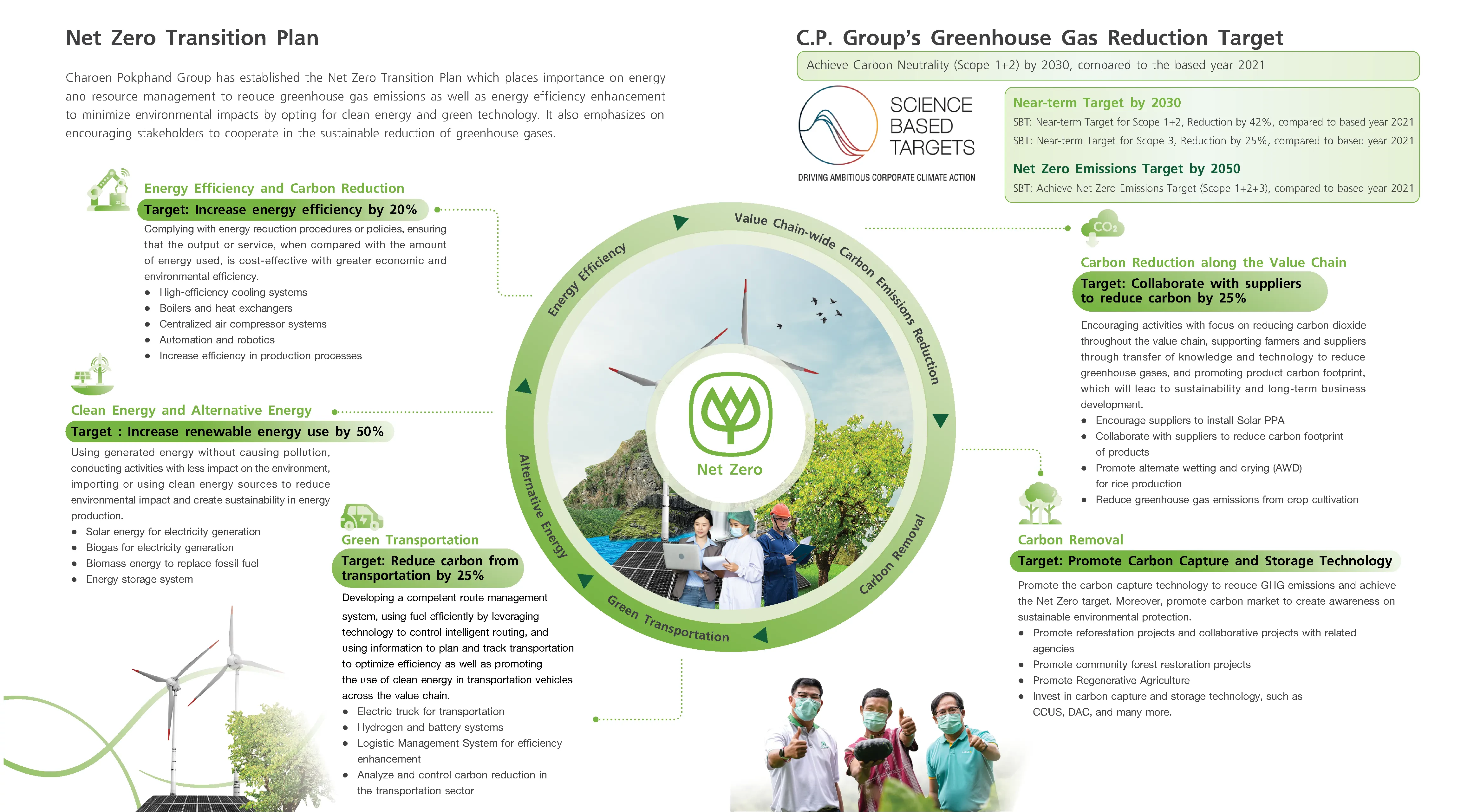Climate Resilience
Goal and Performance
Charoen Pokphand Group aims to enhance our environmental sustainability practices, invest in renewable energy projects, and implement innovative strategies to reduce our carbon footprint. Additionally, we are committed to fostering climate-resilient agricultural practices across our supply chains to mitigate the impact of climate change on our operations and promote sustainable agricultural practices.
Achieve carbon neutrality (Scope 1+2)
SBT near-term target for Scope 1+2, reduction by 42%
SBT near-term target for Scope 3, reduction by 25%
Supporting the SDGs
Charoen Pokphand Group's commitment to reducing GHG emissions, and promotion of climate-resilient agricultural practices support the achievement of six Sustainable Development Goals:
More Details on Sustainable Development Goals Report 2023
Stakeholders Directly Impacted
Charoen Pokphand Group performs stakeholder assessment and prioritization process on an annual basis to evaluate impacts we have on them and how can they influence our strategies and actions over time. In 2023, the evaluation results showed that our commitment to reducing our environmental footprints creates impacts on five stakeholder groups.
More Details on Stakeholder Engagement Report 2023
Our Impacts by the Numbers
-
Charoen Pokphand Group Climate Related Risk Management Report
-
TCFD Report 2023
-
Climate Resilience Policy
-
Air Quality Management Policy
Climate Resilience Management Approach
Climate Resilience Policy Commitment
Environmental Management Systems Certification
Pathway to Carbon Neutral 2030 and Net Zero 2050
GHG Emissions Management, Energy Management, Renewable Energy Management and Air Pollution Management
Environmental Investment
Environmental Investment Initiatives and Projects
Climate Change Adaptation and Mitigation
Product Stewardship
Climate Resilience Management Approach
With the global attention set on the trend to become a Zero Carbon Organization, Charoen Pokphand Group considers this a great challenge for the Group. Therefore, the Group has defined the Carbon Neutral Target and certified with Science-based Target. This target serves as the guideline for managing climate change, which corresponds to the Paris Agreement’s ultimate goal of limiting global warming to no more than 1.5°c.
Charoen Pokphand Group focuses on climate change management and attaches importance to promoting the use of renewable energy, upgrading machinery to render maximum efficiency in all activities, developing modern, fast and non-polluting transportation systems, sourcing sustainable and low-carbon raw materials that do not destroy forests, and planting trees, increasing green space and investing in Carbon Sequestration, which are the key driving factors in achieving our established goals.

Climate Resilience Policy Commitment
At Charoen Pokphand Group (C.P. Group), we recognize the escalating urgency of addressing climate change and its far-reaching impacts on the environment, society, and our business operations. In response, we are committed to implementing our climate resilience policies with an unwavering adherence to the highest international standards. We integrate climate resilience considerations into every aspect of our business, from strategic planning to daily operations, ensuring that our organization remains resilient and adaptable to evolving climate risks.
Our approach prioritizes comprehensive climate risk assessments and the integration of climate-related data across all levels of decision-making. This includes setting ambitious greenhouse gas reduction targets aligned with the latest scientific research and international climate agreements. We are dedicated to enhancing resource efficiency throughout our value chain, optimizing energy use, water consumption, and waste management to minimize our environmental footprint and increase our resilience to resource scarcity and climate-related disruptions.
Furthermore, C.P. Group actively collaborates with a wide range of stakeholders, including suppliers and business partners, to strengthen climate resilience across the entire supply chain. By advocating for sustainable practices, ethical sourcing, and effective resource management, we aim to build a more resilient and reliable supply network. Our engagement extends to local communities and regional stakeholders, where we work to address the specific impacts of climate change on vulnerable populations and promote social resilience through community-driven initiatives.
C.P. Group also plays a proactive role in advocating for robust climate policies that foster sustainable development and climate resilience. By actively engaging with policymakers, we seek to create a supportive environment for climate action, contributing to the broader societal effort to combat climate change.
In addition, C.P. Group invests in innovative climate solutions and technologies that align with our resilience goals. We support and finance projects that advance climate mitigation, adaptation, and community resilience, while encouraging our suppliers and business partners to undertake similar initiatives.
Climate Risk and Opportunity Assessment
Charoen Pokphand Group recognizes the critical importance of understanding climate-related risks and opportunities in our business operations. As part of our commitment to climate resilience, we have undertaken a comprehensive Climate Risk and Opportunity Assessment, including the adoption of the Task Force on Climate-related Financial Disclosures (TCFD) recommendations. This proactive approach allows us to identify, assess, and address climate-related risks and opportunities, ensuring that we navigate the challenges of climate change while embracing the potential for sustainable growth and innovation.
Climate Risk Assessment
We systematically assess the physical, transitional, and reputational hazards related to climate change through our Climate Risk and Opportunity Assessment. Analyzing potential effects on our production procedures, distribution systems, and market demand is part of this approach. Understanding these risks can help us create resilience plans, lessen vulnerabilities, and safeguard our company against climatic disruptions.
Opportunity Assessment
Our climate-focused methodology also finds possibilities that result from the shift to a low-carbon and sustainable economy, in addition to risk assessment. We continually look for ways to match our business practices to changing climatic patterns, technology developments, and consumer expectations. To match changing consumer expectations, this entails making investments in renewable energy sources, putting in place energy-saving technology, and creating sustainable product offerings.
Integration into Decision-making
Assessments of climate risk and opportunity are not stand-alone activities; rather, they are an essential component of our decision-making processes. We make sure that our company is adaptable, competitive, and sustainable in an environment with changing climatic conditions by including climate considerations in our strategic planning and investment decisions.
Climate Change Adaptation and Mitigation
Charoen Pokphand Group recognizes the need to take part in the shared responsibility to solve the problem of climate change in accordance with the Group’s Sustainability Goals and the Paris Agreement, which targets to control the average global temperature rise to well below 2 degrees Celsius while further attempting to control it to not exceed 1.5 degrees Celsius. Therefore, the Group has defined the goal and policy to become a carbon neutral organization by 2030. We have also adapted and mitigated climate change impact through various projects and activities which can be categorized into mitigation actions and adaptation actions.

-
Evaluation of Social Cost of Carbon
Environmental Management Systems Certification
At C.P. Group, we recognize the significance of obtaining Environmental Management Systems (EMS) certification as evidence of our commitment to environmental stewardship and sustainability. EMS accreditation proves our commitment to efficiently managing environmental consequences, builds our reputation with stakeholders, and ensures compliance with laws and regulations around the world.
In markets where environmental responsibility is valued, it also allows us to reduce risks, uncover cost-saving opportunities, and improve environmental performance, giving us a competitive advantage. Additionally, EMS accreditation promotes a culture of environmental awareness among our staff members, generating pride and engagement in the knowledge that they work for an organization that places a high priority on sustainability and actively promotes positive change.
| Certification / Audit / Verification | Coverage (%) |
|---|---|
| EMS is verified through international standards | 50.22 |
| Third-party Certification / Audit / Verification by specialized companies | 15.05 |
| Internal Certification / Audit / Verification by the company’s own specialists from headquarter | 34.73 |
| Total | 100 |
-
Example of Certification
Pathway to Carbon Neutral 2030 and Net Zero 2050
Charoen Pokphand Group is committed to taking bold steps to combat climate change and reduce our environmental impact. We have set two significant milestones - achieving Carbon Neutrality by 2030 and reaching Net Zero emissions by 2050. These ambitious targets drive our dedication to sustainability and reflect our vision for a cleaner, greener, and more resilient future.
Near-term Target by 2030
Net Zero Emissions Target by 2050
GHG Emissions Management, Energy Management, Renewable Energy Management and Air Pollution Management
GHG Emissions Management
Our dedication to environmental responsibility and sustainability at Charoen Pokphand Group motivates us to consistently track, measure, and cut our greenhouse gas emissions. In order to be a model for greenhouse gas management within our industry, we are committed to openly disclosing our progress and striving to raise the standard. The Group thinks that efficient greenhouse gas management is crucial for the health of our planet and the communities we work with as well as for our business.
Moreover, C.P. Group has adopted internal carbon pricing (ICP) to respond to stakeholder expectation, both nationally and internationally, navigate GHG regulations, drive energy efficiency, change internal behavior, drive low-carbon investments, identify and seize low-carbon opportunities, and stress test investment. The ICP also used to engage our sppliers.
GHG Emissions Management Progress
2023 Performance
Total Greenhouse Gas Emissions
Greenhouse Gas Reduction
Greenhouse Gas Emissions (Scope 1 & 2) Intensity
GHG Emissions (Scope 1+2)
By Type
S1 Stationary Combustion
S1 Mobile Combustion
S1 Fugitive Emissions and Others
S2 Electricity
By Business Group
GHG Emissions (Scope 3)

Energy Management
Energy conservation and sustainability are given top priority across the Charoen Pokphand Group's businesses. Our dedication to constant improvement in energy management enables us to increase both our operational effectiveness and financial performance while also reducing our environmental impact. The C.P. Group continues to be unwavering in its objective to be a leader in responsible energy practices and to positively contribute to the global transition to a low-carbon future. We see energy management as a critical pillar of our sustainability efforts.
Energy Management Progress
2023 Performance
Total Energy Consumption
Proportion of Renewable Energy Use
Energy Use Intensity per Unit of Revenue
Type of Energy and Activity
By Business Unit
Renewable Energy Management
We have embraced renewable energy sources widely as part of Charoen Pokphand Group's dedication to sustainability and minimizing our carbon footprint. We have greatly increased our use of clean energy in our operations through strategic investments in solar and other renewable energy projects. This commitment to renewable energy not only aids in reducing climate change, but it also promotes our organization's energy independence and resilience. We are dedicated to having a positive environmental impact and continuing to set the bar for ethical corporate conduct in our sector as we grow our portfolio of renewable energy sources.
Renewable Energy Management Progress
2023 Performance
Proportion of Renewable Energy
Biomass
Biogas
RECs
Solar Energy & PPA
Solar Thermal
Air Pollution Management
Charoen Pokphand Group has put strong measures in place to reduce our emissions and improve the quality of the air because we recognize the serious effects of air pollution on the environment and public health. We have achieved the lowest possible levels of air pollutant emissions by implementing cutting-edge emission control systems, strict operational guidelines, and ongoing monitoring. Our whole supply chain is covered by our comprehensive strategy for managing air pollution, ensuring that all of our partners and suppliers follow high environmental requirements.
Air Pollution Management Progress
2023 Performance
VOCs Emissions
(tons)
Environmental Investment
Charoen Pokphand Group and our affiliates have always placed importance on all aspects of environmental management, including air pollution, water, waste, etc. This has been carried out through environmental investments and environmental management systems that meet international standards and cover all business groups and all countries where the Group operates. The Group also instills in employees the importance of environmental conservation, energy use reduction, efficient use of resources, or reduction of plastic use, etc.
In terms of environmental management, Charoen Pokphand Group has regularly audited the use of resources and energies including the management of waste generated from our business operations using systems and equipment that meet international standards. The Group has made investments in environmental management through a variety of projects, including the development of alternative energy, e.g., investing in solar energy to reduce the use of electricity generated from conventional energy or the use of geothermal heat; investing in renewable energy, e.g., replacing fossil fuels with biofuels or solar cells; investing in the construction of energy-saving buildings, etc.
Summary of Environmental Investments
(million THB)

Environmental Returns on Investment
(Unit : million THB)
| Detail | 2020 | 2021 | 2022 | 2023 |
|---|---|---|---|---|
| Investment Cost | 1,464 | 3,718 | 4,292 | 4,845 |
| Operational Cost | 220 | 474 | 530 | 534 |
| Cost-savings | 590 | 1,144 | 1,545 | 1,637 |
| Energy Reduction (GJ) | 551,189 | 726,123 | 898,047 | 1,012,435 |
Environment Investment Initiatives and Projects

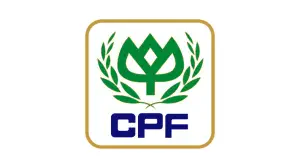
Farm & Factory
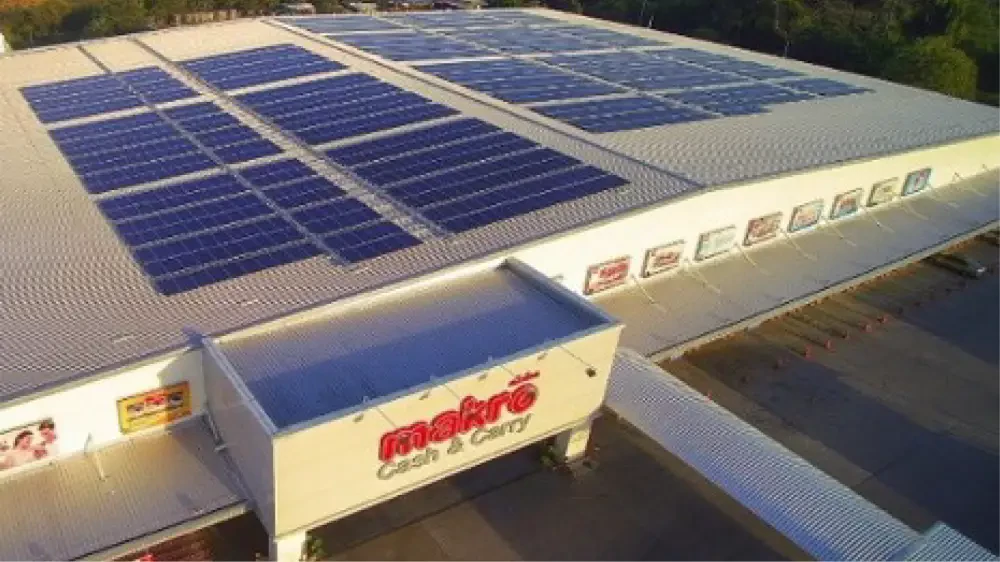

Supercenter

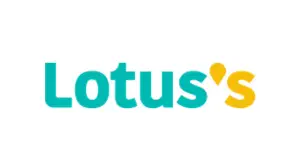
Supercenter
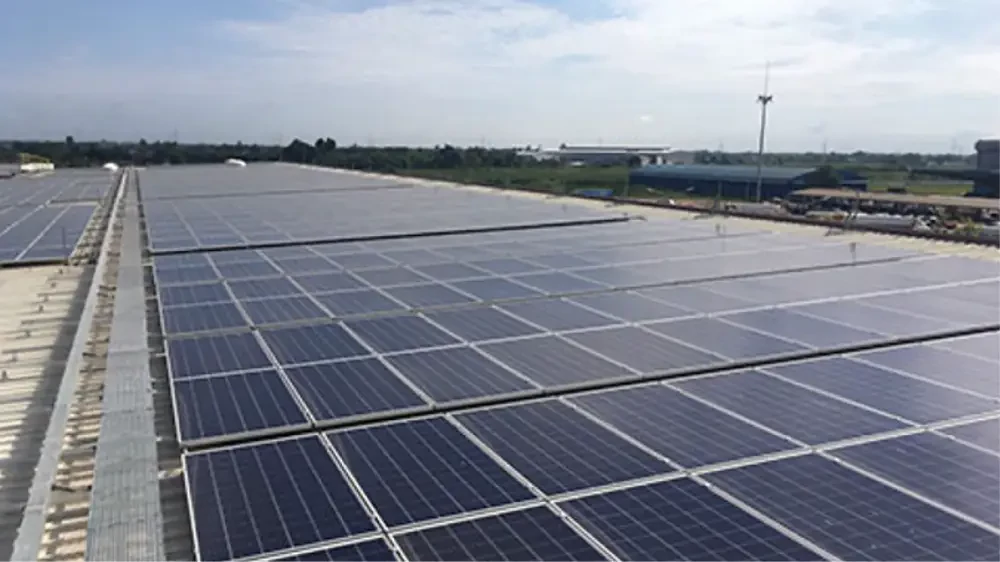
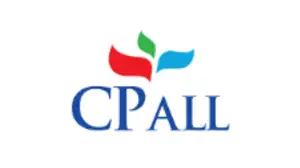
Convenient Stors and Distribution Center
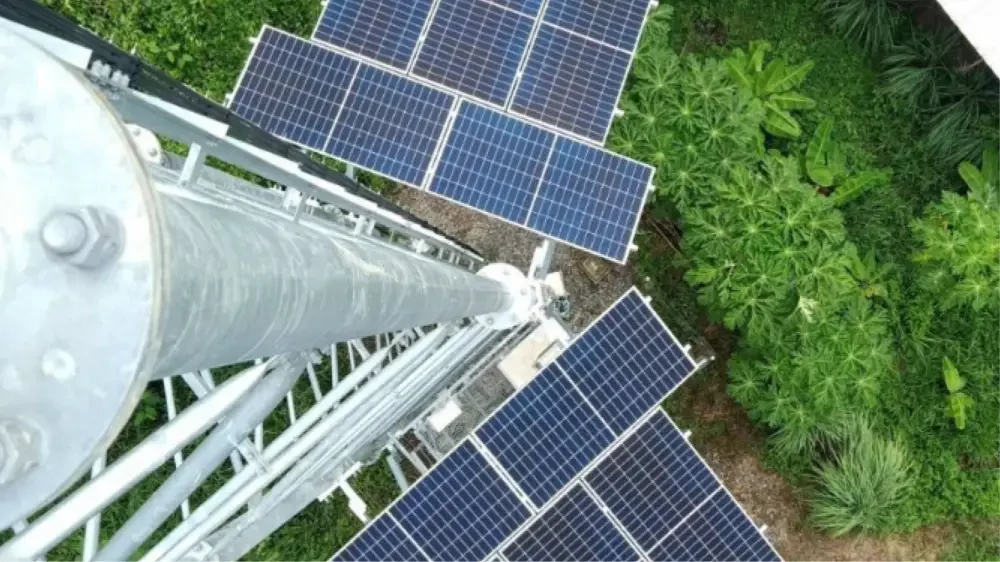

Solar at Base Stations

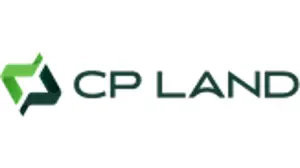
Convention & Exhibition Center


Solar Rooftop


Solar Rooftop
Environmental Awareness Training
Charoen Pokphand Group values climate change management, and the use of renewable energy, the development of highly effective machinery across all activities, the advancement of modern, fast, and pollution-free transportation systems, and the sourcing of sustainable low-carbon raw materials that do not contribute to deforestation. We also focus on tree planting to increase green areas and invest in carbon sequestration, which are critical factors in driving the achievement of our set goals. All employees within the Group are provided with the following knowledge:
- The Group's environmental policies, climate change policies, and others.
- Knowledge about both direct and indirect greenhouse gas emissions.
- Data collection and calculation of greenhouse gas emissions across all three Scopes.
- The framework for managing climate change and energy management.
- The application of technology and innovation to reduce greenhouse gas emissions.
- Case studies of successful initiatives both within and outside the Group.

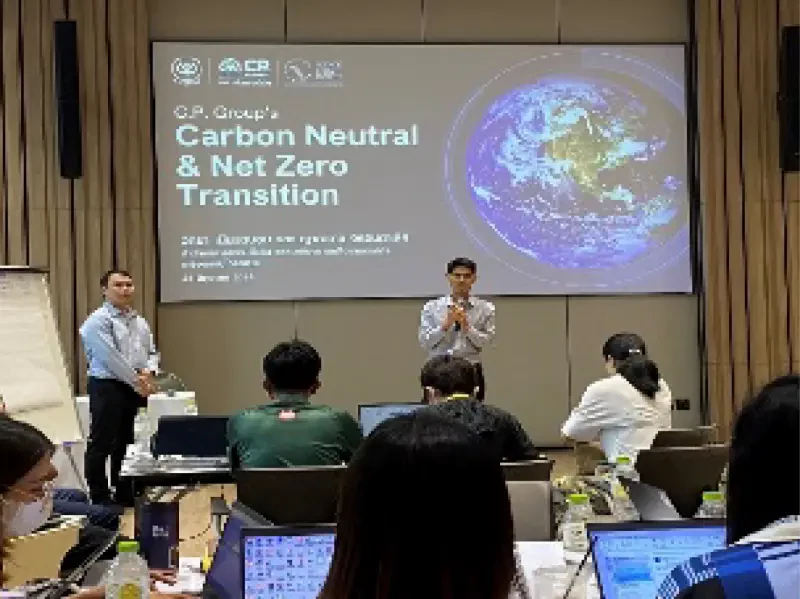
Product Stewardship
Our Product Stewardship Policy at Charoen Pokphand Group is a prime example of our unwavering dedication to sustainability and ethical business conduct. We are responsible for every stage of a product's lifespan, from design to end-of-life management, and we make sure that social and environmental factors are taken into account at each stage. Our sustainable product design prioritizes producing items that are safe for the environment and uphold the highest standards of quality. In order to ensure ethical standards and environmental sustainability, we collaborate closely with our suppliers to ensure responsible sourcing procedures. To lessen our environmental effects and cut greenhouse gas emissions, we make investments in energy-efficient technologies for our production processes.
We place a high priority on product safety and quality, and we abide by all applicable laws and professional standards to make sure our products meet or surpass safety standards. With clear information on environmental claims, recycling options, and correct disposal instructions, transparent labeling and communication help consumers make informed decisions. In an effort to create goods that are easily recyclable, we actively try to limit waste generation during manufacturing and promote recycling throughout the product lifespan. We regularly review and update our product stewardship procedures based on customer input and newly developed best practices, quickly responding to environmental concerns and customer demands as part of our commitment to continuous improvement.
For more information regarding environmental criteria used in the products and services development please see the Product Stewardship Policy
Hazardous Chemicals and Substances Management
Charoen Pokphand Group recognizes the importance of appropriate management of hazardous chemicals and substances, and chemicals used in our products and services, and in the company’s operations in accordance with applicable standards and our CPG’s hazardous chemicals and substances management policy to reduce and eliminate adverse impact to human health and environment.
Target 2023: C.P. Group committed to reducing or phase-out the use of hazardous chemicals and substances, and chemicals used in products and services, in the company's operations following the hierarchy of controls and national and international laws, regulations and standards related to the control of chemical use e.g. Notification of Ministry of Industry, Thailand: List of Hazardous Substances (No.7) B.E. 2565 (2022), and the Restriction of Hazardous Substances (RoHs), etc. to regulate the use of chemicals throughout the life cycle of the product.
In 2023, there was no nonconformity case related to the use of hazardous chemicals and substances, which were controlled in List of Hazardous Substances (No.7) B.E. 2565 (2022), and the Restriction of Hazardous Substances (RoHs) in our products and services.
Product Life Cycle Assessment
Charoen Pokphand Group takes a comprehensive approach to product development through Life Cycle Assessment (LCA). LCA is an essential tool that enables us to evaluate the environmental impacts of our products from cradle to grave. By conducting rigorous LCAs, we gain valuable insights into the resources used, emissions generated, and waste produced throughout a product's entire life cycle. This knowledge empowers us to make informed decisions, optimize our processes, and develop products that have a minimal ecological footprint.
Moreover, we have also assessed the MECO method as a simplified LCA for our products, such as rice and eggs, to screen their environmental impacts in four categories: Materials, Energy, Chemicals, and Others. This assessment covers five stages of the product life cycle: material extraction, manufacturing, transport, use, and end-of-life.
Material flow accounting is one of the externally recognized tools we use to track and analyze the material flows of our products, such as maize and shrimp, which are key products in our crop integration and aquaculture businesses. This approach provides a comprehensive view of material efficiency and environmental impacts.
C.P. Group's Carbon Footprint Labels

877 products
Carbon Footprint of Products (CFP)

92 products
Carbon Footprint Reduction (CFR)

2 products
Carbon Neutral Products

35 organizations
Carbon Footprint of Organization (CFO)

12 projects
Thailand Voluntary Emission Reduction Program (TVERs)
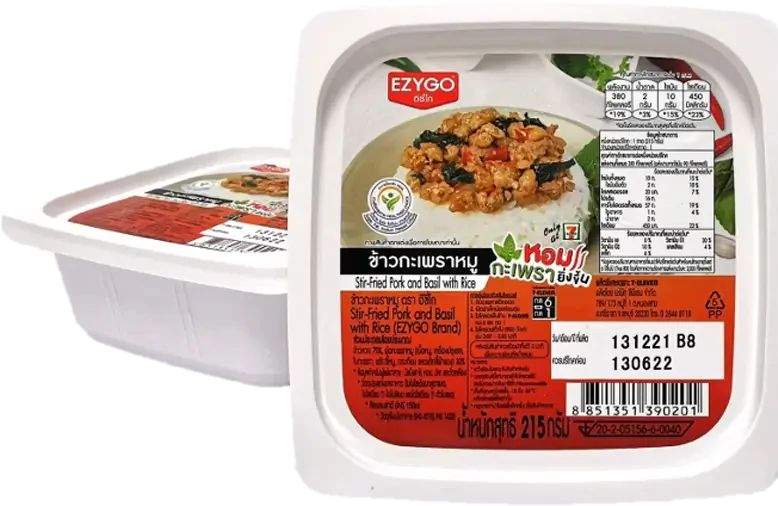


Stir-fried Pork and Basil with Rice (Ezygo)
Certified carbon footprint of 789 gCO2e per box by the Thailand Greenhouse Gas Management Organization (TGO)

Erawan C5 Local Chicken Feed (30 kg.)
Certified carbon footprint of 21.5 gCO2e per sack by the Thailand Greenhouse Gas Management Organization (TGO)
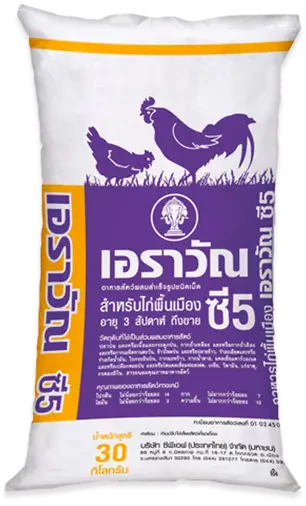


Jerhigh Meat as Meal (Chicken Flavor) (309 Grams)
Certified carbon footprint of 5.09 gCO2e per 1.2 kilogram bag, by the Thailand Greenhouse Gas Management Organization (TGO) Thailand

Fried Rice with Salted Fish and Chinese Kale
Certified carbon footprint of 1.12 gCO2e per box by the Thailand Greenhouse Gas Management Organization (TGO)
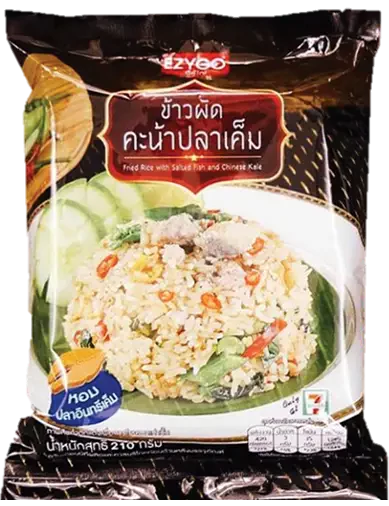
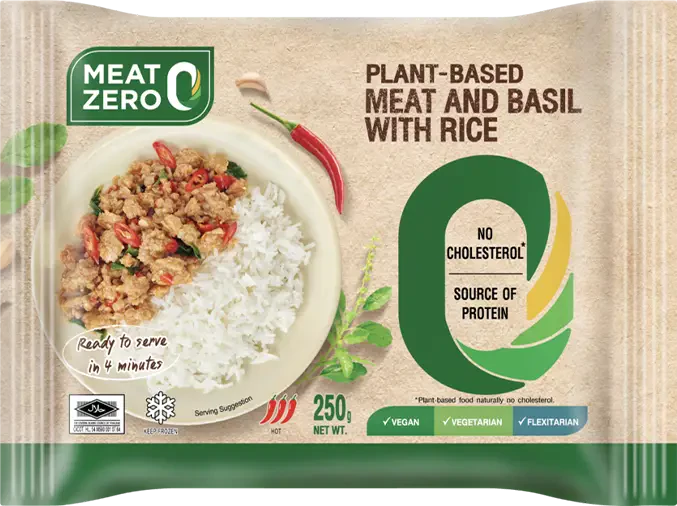

Plant-based Meat and Basil with Rice (250 g.)
Certified carbon footprint of 555 gCO2e per pack by the Thailand Greenhouse Gas Management Organization (TGO)

CP Shrimp Wonton Noodle Soup with Vegetables (309 g.)
Certified carbon footprint of 1.25 kgCO2e per bowl by the Thailand Greenhouse Gas Management Organization (TGO)

Environmental Impacts Throughout the Life Cycle Assessment of Jasmine Rice

C.P. Intertrade Company Limited has carried out the life cycle assessment of Jasmine Rice cultivation in 30 farmers from Yasothon, Sisaket and Phayao provinces to analyze environmental impacts of the product throughout its life cycle.
| Environmental Impact of Producing 1 Kilogram of Jasmin Rice | |||||||
|---|---|---|---|---|---|---|---|
| Impact Type | Unit | Impact | |||||
| Area Preparation | Planting | Care | GHG from Rice Fields | Harvest | Total | ||
| Global Warming | kg CO2 eq | 0.38 | 0.17 | 0.071 | 1.49* | 0.024 | 2.14 |
| Ozone depletion | kg CFC-11 eq | 1.9E-07 | 8.6E-08 | 3.7E-08 | 8.4E-09 | 3.21E-07 | |
| Terrestrial Acidification | kg SO2 eq | 0.0017 | 0.00053 | 0.00090 | 3.0E-05 | 0.0032 | |
| Freshwater Eutrophication | kg P eq | 0.0016 | 1.4E-05 | 0.0016 | 3.0E-08 | 0.0032 | |
| Human carcinogenic toxicity | kg 1,4-DB eq | 0.53 | 0.12 | 0.16 | 0.0072 | 0.82 | |
| Human non-carcinogenic toxicity | kg 1,4-DB eq | 0.00025 | 0.00013 | 6.6E-05 | 5.6E-06 | 0.00045 | |
| Terrestrial ecotoxicity | kg 1,4-DB eq | 0.00070 | 0.0003 | 0.00024 | 9.4E-06 | 0.0012 | |
| Freshwater ecotoxicity | kg 1,4-DB eq | 0.017 | 0.0051 | 0.0062 | 0.00028 | 0.029 | |
| Land use | m2a crop eq | 0.0034 | 0.0057 | 0.0016 | 1.5E-05 | 0.011 | |
| Water consumption | m3 | 0.0012 | 0.0013 | 0.0038 | 7.7E-06 | 0.0029 | |
End of Life Cycle Responsibility
At Charoen Pokphand Group, we view our duty for the end-of-life cycle as a crucial component of our dedication to environmental stewardship. We are committed to managing the complete lifespan of our products because we think that ethical product management goes beyond the point of sale. We place a high priority on recycling, reusing, and ecologically friendly disposal techniques from design to disposal. We make sure that our products have a minimal environmental impact by aggressively promoting the ideas of the circular economy and motivating customers to engage in ethical end-of-life practices.

CPPC Company Limited, under Charoen Pokphand Group, is the leading manufacturer of paper and plastic product packaging. All our products are made of 100% reusable or recyclable materials.
- Plastic sacks
- Food packaging
- PVC products
- Paper core
The Company has implemented many projects to take back products from customers and recycled leftover plastic materials from the manufacturing process, where they undergo a separation and melting process, and are then reused to create new products of higher value.
In 2023, 12.88% of products and materials were reused or recycled by the company to replace virgin plastics and were also processed by subcontractors to make new products, resulting in cost savings of over 130 million Baht.
